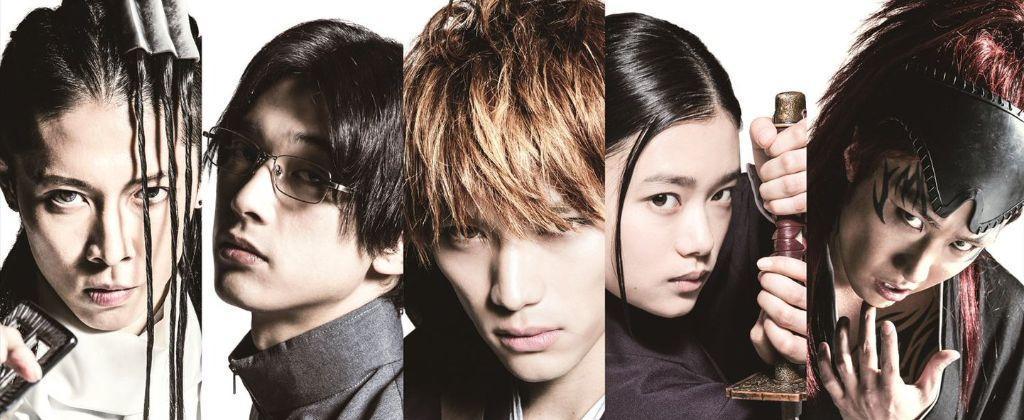
Director Sato Shinsuke has had quite the competition in the past few years. 2017 saw the release of at least four live-action anime adaptations of popular manga properties, so it was a pretty loaded year and particularly with Bleach being thrown in the mix.
The highly popular and long-running publication from creator Tite Kubo made its way to Japanese cinemas last summer. It wasn’t long before plans went underway to appeal to the Bleach fandom overseas to bare witness to Sato’s treatment, and given what I just saw, I say with reassuring pride that I can see why.
The pace gains its footing from the very beginning, taking shape on its own where needed but never losing pace or track of the source material where it counted. Cohesive dialogue and performances from our cast help flourish the narrarive even further, led by the prospective casting of Blade Of The Immortal co-stars, actor Fukushi Sota and actress Sugisaki Hana.
Enter Karakura Town where we meet Ichigo (Fukushi), a tough teenage high schooler gifted with the ability to see ghosts. When the emergence of a Shinigami – a soul reaper – named Rukia (Sugisaki) triggers a harrowing battle with a creature known as a Hollow, what ensues for Ichigo is a perilous joruney of self-discovery between realms.
Having bonded with Rukia’s powers in a desperate life-saving ritual at her own will, Ichigo is forced to come to terms with circumstances he nary understands. Left with a human shell to disguise herself and with counsel from Soul Society exile Kisuke (Tanabe Seiichi), she uses a special glove to help Ichigo switch between his human and spirit form to fight Hollows and act out the duties attributed to soul reaper agents.
His vociferous, stubborn and reluctant reception to the call of duty notwithstanding, little does he realize the cardinal sin Rukia committed in the dissemination of her powers. With spirit energy serving as the beacon for a soul reaper, it’s not long before her brother, Byakuya (MIYAVI) and lieutenant Renji (Saotome Taichi), discover this and make way from their realm in the Soul Society to track Rukia down, execute her if needed and enforce the Shinigami code to a fault.
Screenwriter Habara Daisuke’s script exudes breathless poise, acumen and dexterity throughout. Much to our benefit, we get an amply-sized supporting cast for the nimble balance of characters and screentime for the film’s duration, particularly with Ichigo’s friends, Chad (Koyanagi Yu) and the lovelorn Orihime (Mano Erina).
Ichigo’s tragic childhood is also brought full circle along with the introduction of Uryu (Yoshizawa Ryo), the last of the Quincys – a near-extinct tribe of spirit warriors rivaling the Shinagami. Eguchi Yosuke gives an especially fond and moving performance next to Fukushi as Ichigo’s frequently sportive father, Isshin, with appearances by Sato’s I Am A Hero co-star, actress Nagasawa Masami who plays Ichigo’s late mother, Masaki. The film also goes out of its way to lend a brief glimpse at the brooding exterior of the Soul Society outside Byakuya’s which is, in itself, one of the most thrilling teases you get for loving this film so much.
The action sequences in Sato’s Bleach, courtesy of Shimomura Yuji, rest plentily in familiarity with the manga and respective anime. Hollows tearing through buildings and cars are observed as tornados or otherwise strange events as cleverly hinted at in the film’s opening credits. An entire intersection is decmiated between Hollow activity and the ensuing final, dramatic battle between Ichigo, Renji and Byakuya which bodes a thrilling, Zanpakuto-wielding, lightning speed feast feast on the eyes, and elevated no less by Yamada Yutaka’s edgy, compelling rock score.
Compared to Hollywood, even Japan has its shortfalls at times when it comes to adaptations; I wouldn’t completely know since I’ve only seen a handful of recent films of the kind to date. For example Sori Fumihiko’s treatment of Fullmetal Alchemist was a healthy family-friendly oddity and for this, it felt a little tame for what the anime itself in “Brotherhood” brought to the table, for example. Fukuda Yuichi’s Gintama was a rousing package, though it gave the impression that it was missing a few things.
Both films, released in 2017, were generally cohesive in their construction. They also shared the same space of a year as Kentaro Hagiwara’s Tokyo Ghoul in addition to at least two of Miike Takashi’s 2017 banner titles, JoJo’s Bizzare Adventure and his spring bloody samurai epic, the aforementioned Blade Of The Immortal. In face of all this competition, Sato’s Bleach, despite any doubts to the matter, was ripe for the occasion.
Frankly, I’m rooting for what Sato has achieved with this latest bit of manga fanfare. The film bookends with a brilliant finish that doesn’t cliffhang too deeply, putting to rest, for better or worse, any sequel aspirations there may be. The fact that even the noted mangaka himself gave this movie his blessing at one point was promising enough between last year and now and for this, provided all ends are met accordingly, I really hope this one gets a sequel. And you might even agree.
Netflix link: https://www.netflix.com/title/80217733
Official Japanese website: http://wwws.warnerbros.co.jp/bleach-movie/sp/

